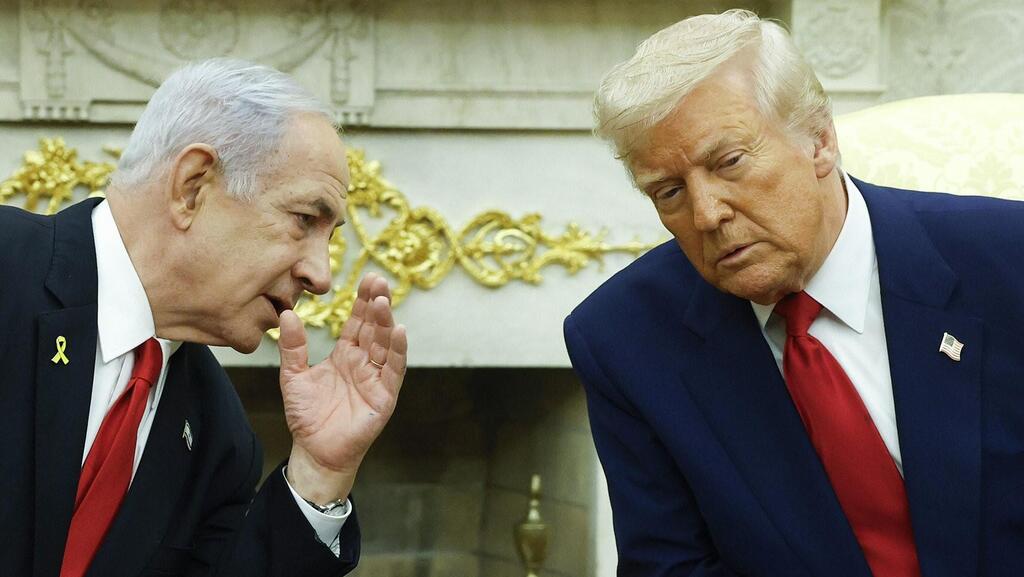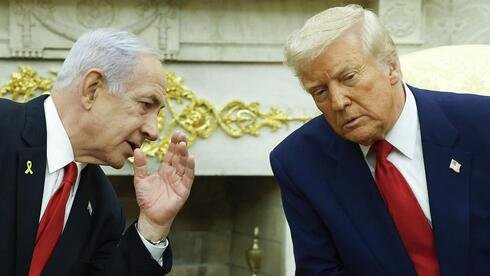There is no longer a debate – the U.S.-Israel relationship is undergoing a profound reorientation. What was once a bipartisan pillar of American foreign policy has become a battleground, where alliances are fluid, principles are negotiable, and long-standing commitments are subject to political whims.
3 View gallery


Prime Minister Benjamin Netanyahu and U.S. President Donald Trump
(Photo: Kevin Dietsch, GettyImages)
This reorientation is not just a matter of policy but a cultural phenomenon. Influential figures on both the left and the right are increasingly questioning the U.S.-Israel alliance. On the right, prominent conservative voices like Joe Rogan, Tucker Carlson, Candace Owens, and Theo Von have called for a recalibration of the relationship—often laced with thinly veiled antisemitic tropes.
Meanwhile, on the left, figures such as Abby Martin, Mehdi Hasan, Glenn Greenwald, Hasan Piker, and Angela Davis have turned their platforms into arenas for relentless criticism of Israel. This ideological convergence is a warning sign: skepticism toward Israel is not just a progressive or ‘woke conservative’ sentiment, but a mainstream one.
What is clear is that the ground is shifting beneath Israel’s feet. And if Israel’s leadership cannot articulate a coherent vision for peace and prosperity in the region, and its public diplomacy doesn’t experience a complete overhaul, it will be swept away by the currents of American realignment.
So what is the solution? A piece of the answer lies in philanthropy.
American Jews, pro-Israel philanthropists, and their allies must recognize the shifting landscape and respond with strategic investment. This is not merely about donating to Israeli hospitals or museums—noble causes though they are—but about creating a robust, resilient ecosystem of educational, cultural, and policy initiatives that can bolster Israel’s standing in the U.S.
First, invest in Israeli society itself. Support initiatives that strengthen Israel’s democratic institutions, protect judicial independence, and promote a pluralistic society. Fund organizations that counter religious extremism and champion civil liberties, ensuring that Israel’s values remain aligned with those of the United States. Philanthropy can serve as a bulwark against the rise of messianic extremists who seek to impose a theocratic vision on Israeli society.
Second, adopt a sophisticated social and traditional media strategy. Learn from the success of countries like Saudi Arabia, which have invested heavily in all forms of media to shape narratives and project a positive image. Pro-Israel philanthropists should fund media training, support digital content creators, create a bench of influential podcasters, talking heads and activated celebrities, and ensure that balanced, fact-based perspectives on Israel reach a wide audience.
Third, invest in bipartisan policy advocacy. Support think tanks and research centers that work with both Republicans and Democrats, ensuring that U.S.-Israel relations remain a nonpartisan issue. This means engaging openly with policymakers across the political spectrum, funding bipartisan educational trips to Israel, and equipping the next generation of advocates with the skills to engage a diverse audience.
Finally, prioritize education. Endow university chairs and fellowships in Middle Eastern studies, ensuring that pro-Israel scholars have a platform in academia. Sponsor programs that bring American students to Israel, allowing them to witness the country’s complexity firsthand rather than absorbing distorted narratives.
This is not the time for complacency. It is a moment of reckoning. But with strategic vision, American Jews and their allies can ensure that the U.S.-Israel relationship is not merely preserved but strengthened for a new generation.
Bio: Coby Schoffman is a Los Angeles-based founder of The Nation Foundation, an organization dedicated to delivering educational solutions to youth in conflict zones across Africa.
Coby Schoffman is a San Francisco-based serial social entrepreneur and Founder of The Nation Foundation.

